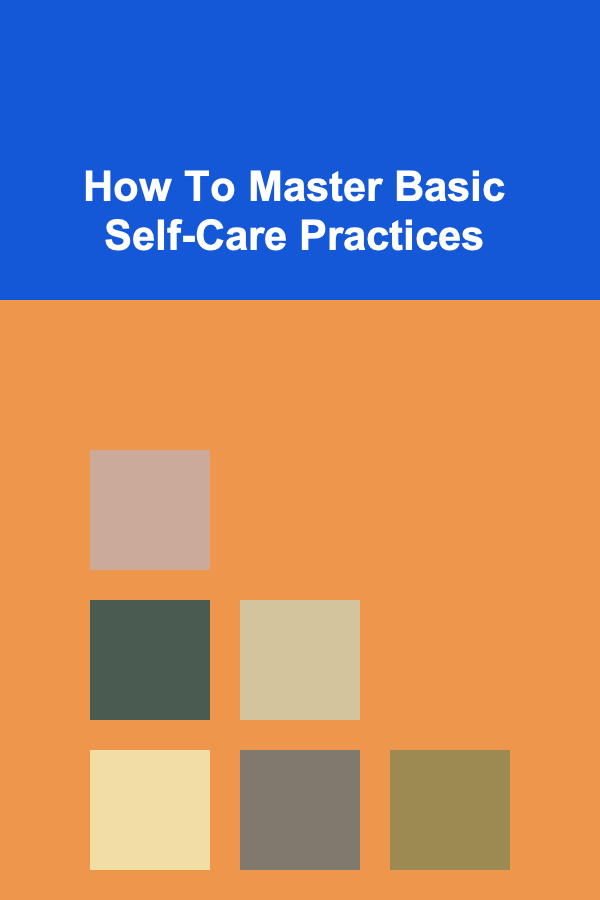
How To Master Basic Self-Care Practices
ebook include PDF & Audio bundle (Micro Guide)
$12.99$7.99
Limited Time Offer! Order within the next:

Self-care is a concept that has gained widespread attention in recent years, yet it's often misunderstood. Many people associate self-care with indulging in luxuries, such as spa treatments or shopping sprees, but it goes far beyond that. True self-care involves adopting habits that support your physical, mental, and emotional well-being. Mastering basic self-care practices can improve your overall health, enhance your quality of life, and allow you to show up as your best self in various areas of your life.
In this article, we will explore what self-care truly means, why it's important, and how you can master the basic self-care practices that form the foundation of a balanced, fulfilling life.
What Is Self-Care?
Self-care is the deliberate and intentional act of taking care of one's physical, mental, and emotional health. It is about making choices that nurture your well-being and maintaining a lifestyle that supports your needs. Although self-care looks different for everyone, the core principle remains the same: it is about taking time for yourself to rest, recharge, and heal.
Self-care can be broken down into several categories, including physical self-care, emotional self-care, mental self-care, and spiritual self-care. The goal of self-care is not just to pamper yourself occasionally but to build sustainable practices that nurture your overall health.
Why Is Self-Care Important?
While many people understand the importance of physical health, it's easy to forget that mental and emotional health are equally significant. Often, when life gets busy or stressful, we may neglect the essential practices that keep us balanced. Yet, neglecting self-care can lead to burnout, poor health, and decreased productivity. Prioritizing self-care helps you manage stress, build resilience, and improve your overall quality of life.
Here are several key reasons why mastering self-care practices is important:
1. Prevents Burnout
Constantly being on the go without taking breaks can quickly lead to burnout. This happens when your mental and physical energy is drained from overworking, not taking time to relax, and ignoring your body's signals. Regular self-care practices help replenish your energy and prevent burnout, ensuring you stay productive and healthy.
2. Boosts Mental Health
Practices such as journaling, mindfulness, and therapy can significantly improve your mental health. Regular self-care allows you to process emotions, manage anxiety or depression, and prevent mental health issues from escalating.
3. Improves Physical Health
Basic self-care practices like eating nutritious meals, exercising regularly, and getting enough sleep are critical for maintaining physical health. When you take care of your body, you are more likely to experience increased energy, better immune function, and reduced risk of chronic illnesses.
4. Enhances Relationships
Taking care of yourself is also an act of kindness to others. When you prioritize your well-being, you become a better partner, friend, colleague, and family member. Self-care allows you to show up more present, empathetic, and engaged in your relationships.
Basic Self-Care Practices to Master
Now that we understand the importance of self-care, let's dive into the essential practices that form the foundation of a well-balanced self-care routine. These practices address physical, emotional, and mental well-being, ensuring that you take care of yourself in a holistic way.
1. Physical Self-Care
Physical self-care is the cornerstone of any healthy lifestyle. Our bodies need rest, proper nutrition, and regular movement to function at their best. Here are some of the most important physical self-care practices to adopt:
1.1 Sleep Hygiene
Sleep is one of the most essential components of physical health. Poor sleep affects your mood, cognitive function, and immune system. Establishing a healthy sleep routine is one of the simplest ways to practice physical self-care. Here are some tips to improve your sleep hygiene:
- Maintain a Consistent Sleep Schedule: Go to bed and wake up at the same time every day, even on weekends. This helps regulate your body's internal clock and improves sleep quality.
- Create a Relaxing Bedtime Routine: Wind down before bed with calming activities like reading, meditating, or taking a warm bath.
- Avoid Stimulants Before Bed: Caffeine, nicotine, and heavy meals can interfere with your ability to fall asleep. Aim to avoid these in the hours leading up to bedtime.
- Limit Screen Time: The blue light emitted by phones and computers can disrupt your sleep cycle. Try to avoid screens at least an hour before bed.
1.2 Exercise Regularly
Physical activity is essential for maintaining good health. Regular exercise helps improve cardiovascular health, increase strength and flexibility, and boost mental clarity. Find an exercise routine that works for you, whether it's walking, yoga, weight training, or swimming.
Start with 30 minutes of moderate-intensity exercise, 5 days a week. This could be a brisk walk, a workout class, or even dancing to your favorite music at home.
1.3 Eat Nutritious Foods
A well-balanced diet plays a vital role in maintaining good health. Incorporate plenty of fruits, vegetables, lean proteins, and whole grains into your meals. Avoid highly processed foods and sugary drinks that can negatively affect your energy levels and overall well-being.
Hydration is also an important aspect of physical self-care. Aim to drink at least eight 8-ounce glasses of water per day, and more if you're active or in hot climates.
1.4 Listen to Your Body
Pay attention to your body's signals. If you're feeling fatigued, take a break and rest. If you're experiencing discomfort, consult a healthcare provider. Tuning into your body's needs is an essential aspect of physical self-care.
2. Emotional Self-Care
Emotional self-care involves taking care of your feelings and mental health. It's important to process emotions, manage stress, and foster emotional resilience. Here are a few emotional self-care practices to try:
2.1 Mindfulness and Meditation
Mindfulness and meditation are powerful tools for calming the mind and reducing stress. These practices involve focusing on the present moment and letting go of past or future worries. Regular mindfulness practice can help you better manage your emotions and increase your sense of well-being.
To begin, try setting aside 5--10 minutes each day to practice mindfulness. Sit in a quiet space, close your eyes, and focus on your breath. Whenever your mind wanders, gently bring your focus back to your breath.
2.2 Journaling
Journaling is a therapeutic activity that allows you to express your thoughts and emotions. Writing down your feelings can help you process difficult experiences, gain clarity, and release pent-up emotions. You don't need to follow any specific format---just write what's on your mind.
Consider setting aside time each day or week to journal. It can be a valuable tool for gaining insight into your emotional world.
2.3 Set Healthy Boundaries
Part of emotional self-care is learning to say "no" when necessary. Setting healthy boundaries helps protect your energy and emotional well-being. Whether it's limiting your availability to others or making time for yourself, boundary-setting ensures that you're not overwhelmed by others' demands.
3. Mental Self-Care
Mental self-care refers to activities that stimulate the mind and help you focus, think critically, and expand your knowledge. A healthy mind requires regular mental exercise, challenge, and relaxation. Here are some mental self-care practices to consider:
3.1 Engage in Lifelong Learning
Engage in activities that challenge your mind, such as reading, taking courses, solving puzzles, or learning a new skill. Lifelong learning keeps your brain sharp and promotes cognitive function. Whether it's reading a book, taking an online course, or picking up a new hobby, keeping your mind active is essential.
3.2 Practice Positive Self-Talk
Negative self-talk can be detrimental to your mental health. Replacing self-criticism with positive affirmations helps reframe your thoughts and boosts self-esteem. Practice speaking to yourself kindly, and focus on your strengths rather than your shortcomings.
3.3 Limit Information Overload
In today's digital age, we are constantly bombarded with information. Too much news, social media, or email can lead to mental overload. Consider limiting your exposure to information, especially before bed or during moments when you need to focus on self-care.
4. Spiritual Self-Care
Spiritual self-care involves activities that nurture your sense of purpose, connection, and inner peace. It doesn't necessarily have to be tied to a specific religion; spiritual self-care is about aligning with your values and finding peace in your life.
4.1 Practice Gratitude
Gratitude is a powerful spiritual practice that helps shift your focus from what you don't have to what you do have. Start a gratitude journal where you write down three things you're grateful for every day. Over time, you'll develop a more positive and appreciative mindset.
4.2 Spend Time in Nature
Spending time outdoors and connecting with nature can have a profound effect on your spiritual well-being. Whether it's a walk in the park, hiking in the mountains, or simply sitting by the water, nature has a calming and grounding effect that can help you reconnect with yourself.
4.3 Meditation and Prayer
For those who have a spiritual or religious practice, prayer or meditation can be a form of self-care. These practices provide a sense of connection to something greater and help foster inner peace and clarity.
Conclusion
Mastering basic self-care practices is essential for maintaining a balanced and healthy life. By incorporating physical, emotional, mental, and spiritual self-care into your routine, you can build a strong foundation for overall well-being. Self-care isn't about perfection; it's about consistently making time for yourself and engaging in activities that nurture your health and happiness. With regular practice, self-care becomes a habit that supports your personal growth, resilience, and peace of mind.
Remember, self-care is not selfish---it's necessary. Prioritize it in your daily life, and watch how it transforms your overall sense of well-being and joy.

How to Organize Your Bathroom Storage for Maximum Efficiency
Read More
How to Set Up Taxes and Legal Requirements for Your Shopify Dropshipping Store
Read More
How to Stage Your Home for Different Seasons
Read More
Transforming Operations: Strategies and Case Studies for Success as an Operations Director
Read More
How To Live a Life of Self-Awareness
Read More
How to Use Robo-Advisors for Investing
Read MoreOther Products

How to Organize Your Bathroom Storage for Maximum Efficiency
Read More
How to Set Up Taxes and Legal Requirements for Your Shopify Dropshipping Store
Read More
How to Stage Your Home for Different Seasons
Read More
Transforming Operations: Strategies and Case Studies for Success as an Operations Director
Read More
How To Live a Life of Self-Awareness
Read More